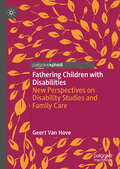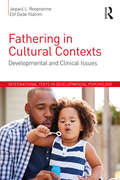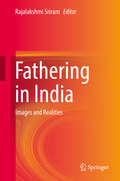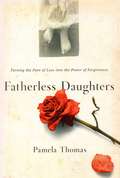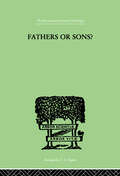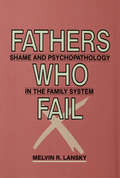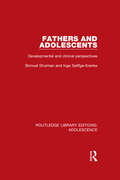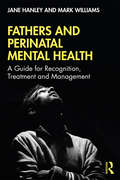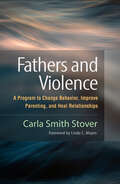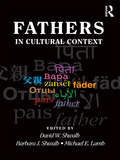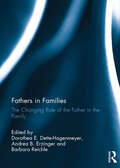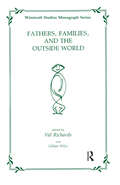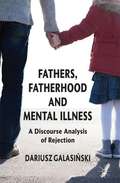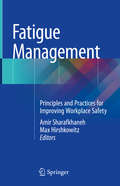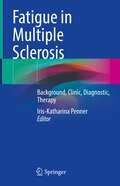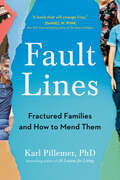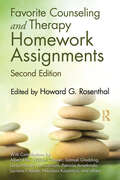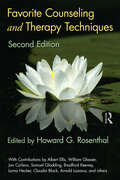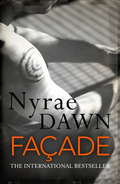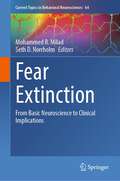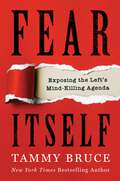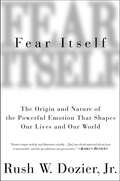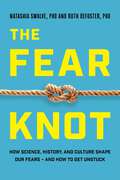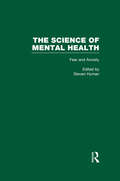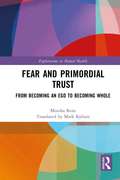- Table View
- List View
Fathering Children with Disabilities: New Perspectives on Disability Studies and Family Care
by Geert Van HoveThis book explores the often-forgotten role of fathers of children with disabilities. Bridging the gap between disability studies, family studies, and gender studies, it uncovers men's perspective on caring for children with disabilities and presents examples of famous fathers, such as general Charles de Gaulle, film director Dan Habib, and scholars Michael Bérubé and Phil Ferguson. Drawing on interviews with fathers of children with disabilities, the author explores what makes a father a 'good father' and presents fatherhood as an intense and dynamic journey of discovery, experienced together with the children, as a process of ‘becoming with’. The testimonies offer an insight into the lived experience of fathers and challenge the model of caring masculinity through a narrative approach, with the aim to answer burning questions: can we built research lines around the experiences of fathers? can we secure the father perspective within family research and within support services for families with children with disabilities? A must read for academics in social science, education, and medical fields.
Fathering in Cultural Contexts: Developmental and Clinical Issues (International Texts in Developmental Psychology)
by Jaipaul L Roopnarine Elif Dede YildirimHow do men think about fathering? How does this differ across different regions of the world? And what effect does this have on child development? Fathering in Cultural Contexts: Developmental and Clinical Issues answers these questions by considering a broad range of theoretical and conceptual models on fathering and childhood development, including attachment theory, developmental psychopathology, masculinity and parenting typologies. Roopnarine and Yildirim provide a comprehensive view of fatherhood and fathering in diverse cultural communities at various stages of economic development, including fathers’ involvement in different family structures, from two-parent heterosexual families to community fathering. This book’s interdisciplinary approach highlights the changing nature of fathering, drawing connections with child development and well-being, and evaluates the effectiveness of a range of father interventions. Fathering in Cultural Contexts will appeal to upper level undergraduate and graduate students in human development, psychology, sociology, anthropology, social work, and allied health disciplines, and professionals working with families and children in non-profit and social service agencies across the world.
Fathering in India: Images and Realities
by Rajalakshmi SriramThis book covers the underexplored subject of ‘fathering’ in India. It delves into the shared aspirations of men in India to nurture their children in sensitively attuned ways within the culturally prescriptive context that governs men’s roles as providers and caregivers. This work is based on over two decades of intensive research in India on how different groups construct and experience fatherhood and fathering under changing circumstances. It unmasks the heterogeneity that exists within fathering in India through conversations with fathers across diverse contexts—in privileged economic situations and those in difficult home and family circumstances, having children with disability, single-parent fathers and fathers in the military. A separate section discusses fathering daughters and shared parenting. Images and role models in fathering are brought alive through analysis of Hindi films, the media, children’s literature and classical literature. The conceptual analysis moves beyond the power and control dimensions commonly used to describe Indian men and fathers, to highlight their resilience, adaptability, positive involvement and developmental trajectories. This volume is for scholars, researchers and practitioners in developmental psychology, human development and family science, sociology, early childhood education and psychiatry, pediatrics, community medicine and allied fields.
Fatherless Daughters: Turning the Pain of Loss into the Power of Forgiveness
by Pamela ThomasA moving, elegantly written, and exhaustively researched account of what it means for a girl to lose a father to death or divorce—with advice for fatherless daughters on how to cope. &“People who lose their parents early in life are like fellow war veterans. As soon as they discover that they are talking to someone else who has lost a parent, they know they are speaking the same language without uttering a word.&” Pamela Thomas gives voice to this unspoken pain in Fatherless Daughters. Still haunted by her own father&’s death when she was ten, Thomas decided to explore its effects. Though her journey began as a personal one, she soon felt the need to hear from other women and ended up interviewing more than one hundred fatherless women. They ranged in age from nineteen to ninety-four; they came from all areas of the country as well as Europe and Asia; some had lost their fathers to death, others to divorce or abandonment. Each account was unique, but the impact of a father&’s loss was profound in every woman&’s life. Thomas begins by defining what it means to be a father in our world. She discusses the initial shock of his loss, exploring the aspects that color how a young girl experiences it: her age at the time of her father&’s death or abandonment, her mother&’s behavior and attitudes, her place in the family vis-à-vis siblings, and the influence of a stepfather or father-surrogates. Thomas shows how a father&’s early death or abandonment affects a woman&’s emotional health and self-esteem, her body image, her sexual experiences, her marriage, her family life, and her career. Perhaps most important, Thomas offers compassionate advice for coming to terms with father loss, even late in life, from actively mourning, to healing, to starting fresh.
Fathers Or Sons?: A STUDY IN SOCIAL PSYCHOLOGY
by Hopkins, PrynceFirst Published in 1999. Routledge is an imprint of Taylor & Francis, an informa company.
Fathers Who Fail: Shame and Psychopathology in the Family System
by Melvin R. LanskyDespite the burgeoning literature on the role of the father in child development and on fathering as a developmental stage, surprisingly little has been written about the psychiatrically impaired father. In Fathers Who Fail, Melvin Lansky remedies this glaring lacuna in the literature. Drawing on contemporary psychoanalysis, family systems theory, and the sociology of conflict, he delineates the spectrum of psychopathological predicaments that undermine the ability of the father to be a father. Out of his sensitive integration of the intrapsychic and intrafamilial contexts of paternal failure emerges a richly textured portrait of psychiatrically impaired fathers, of fathers who fail. Lansky's probing discussion of narcissistic equilibrium in the family system enables him to chart the natural history common to the symptomatic impulsive actions of impaired fathers. He then considers specific manifestations of paternal dysfunction within this shared framework of heightened familial conflict and the failure of intrafamilial defenses to common shame. Domestic violence, suicide, the intensification of trauma, posttraumatic nightmares, catastrophic reactions in organic brain syndrome, and the murder of a spouse are among the major "symptoms" that he explores. In each instance, Lansky carefully sketches the progression of vulnerability and turbulence from the father's personality, to the family system, and thence to the symptomatic eruption in question. In his concluding chapter, he comments tellingly on the unconscious obstacles - on the part of both patients and therapists - to treating impaired fathers. The obstacles cut across different clinical modalities, underscoring the need for multimodal responses to fathers who fail.
Fathers and Adolescents: Developmental and Clinical Perspectives (Routledge Library Editions: Adolescence #9)
by Inge Seiffge-Krenke Shmuel ShulmanThe understanding and study of fathers has traditionally assumed that fathers, compared to mothers, are less involved with their children. Originally published in 1997 Fathers and Adolescents presents a different approach that focuses on the distinctive role of fathers in the lives of their adolescents, especially in their role in adolescents’ attainment of developmental tasks. Drawing on a variety of disciplines, the authors’ examine the relationships of fathers to their adolescents in the context of a changing society. They find that fathers interact in ways that are different from those of mothers, but that are important for both normal and disturbed adolescent development. Psychopathological, aggressive and incestuous behaviour is considered as well as the role of the father in more ideal circumstances. Drawing on the authors’ wealth of clinical experience, this title will still be an important resource for all professionals working with adolescents, as well as those in research.
Fathers and Perinatal Mental Health: A Guide for Recognition, Treatment and Management
by Mark Williams Jane HanleyIt is only in recent years that there has been development in the awareness of the father’s mental health. Yet, the father’s mental health can influence the mother, the infant, the family and society. This book seeks to address the reasons why the father or the potential father could suffer from a mental disorder or illness during the perinatal period, his reactions, and what can be done to help him. The book explores the way in which fathers’ mental health has presented in the past and how it presents now. It looks at the father’s attitudes towards his mental well-being and how he may self-manage and self-medicate. It examines the impact and influence the potential father and the father’s mental health has on his partner, infant and children. The reasons for certain disorders and illnesses are outlined, along with how they may manifest and are managed. Treatment options and types of medication are discussed and the ways in which the father can access the best possible help and support. Stories from fathers who have suffered from a particular mental illness or condition help others to understand both the practicalities and realities. The uniqueness of the shared stories from fathers highlights why recognition treatment and management are important to help other fathers improve their relationship with their partner and infant and to improve their own wellbeing. The book is intended to help health practitioners and anyone who is concerned about fathers’ mental health.
Fathers and Violence: A Program to Change Behavior, Improve Parenting, and Heal Relationships
by Carla Smith StoverThis highly accessible book presents a new approach to treating men who use violence against their partners and/or children. The Fathers for Change (F4C) program has a unique focus on fostering fathers' accountability and reflective functioning, and repairing father–child relationships. Grounded in theory and research, it addresses a key need for parents who want to stay together or coparent successfully in the aftermath of violence, while prioritizing all family members' safety. Clinicians learn how to implement each component of F4C, from assessment to individual-focused work to coparent and family sessions, if appropriate. Illustrative case vignettes are featured throughout. An appendix provides 32 reproducible forms, worksheets, and handouts that can be downloaded (many in a fillable format) and printed as needed.
Fathers in Cultural Context
by Michael E. Lamb David W. Shwalb Barbara J. ShwalbA CHOICE Outstanding Academic Title 2013! Winner, APA Division 52 Ursula Gielen Global Psychology Book Award, 2014! This new volume reviews the latest research on fathering from every continent, from cultures representing over 50% of the world’s population. International experts on 14 societies/regions discuss cultural and historical influences, variations between and within cultures, and socio economic conditions and policies that impact fathering. Contributors from several disciplines provide thought-provoking reviews of the empirical data to help us gain an understanding of fathering worldwide. Over 1,000 studies on fathering published in languages other than English are made accessible to readers around the world. The cultures were selected based on availability of substantial research on fathering; representation of worldwide geography; a balance between large, middle, and small populations; and significance for a global understanding of fathering. Each chapter features personal case stories, photos, and maps to help readers create an engaging picture for each culture. Empirical evidence is blended with the authors’ expert opinions providing a comprehensive view of what it is like to be a father in each culture. The book opens by explaining theoretical and methodological underpinnings of research on fathers. The main chapters are then organized by world regions—Asia and the Middle East, Africa, North and South America, Europe, and Australia. The conclusions chapter integrates and compares all the chapters, and makes suggestions for future research. Every chapter follows the same structure, making it easy for readers to compare fathers between cultures, or to compare chapters as a textbook:• Opening case story of one father’s life • Cultural/historical background and influences on fathers • Comprehensive review of research on fathering in that culture • Sub-cultural variations in fathering • Social/economic conditions and policies that impact fathering: divorce, never-married fathers, immigration and migration, and economic disparities • Government policies and laws relevant to fathering• Comparisons with fathers in other societies • Summary highlighting the most pertinent information presented in the chapter This thought-provoking anthology is also an ideal text for graduate or advanced undergraduate courses on child development, fathering, or family processes taught in family studies, psychology, sociology, anthropology, education, and gender/women’s studies, and ethnic studies departments. Practitioners, educators, policymakers, and researchers interested in the study of father involvement will also appreciate this book.
Fathers in Families: The Changing Role of the Father in the Family
by Dorothea E. Dette-Hagenmeyer, Andrea B. Erzinger and Barbara ReichleThe role of the father in a family and for his children has varied greatly throughout history. However, scientific research into fatherhood began relatively late at the end of the 1960s and early 1970s, with a strong focus on the impact of the father on child development. This book focuses on the role of the father in the contemporary two-parent heterosexual family. Of eight longitudinal studies from several Western countries, six focus on the socialization outcomes of the children, and two concentrate on parental satisfaction. Although the father is in focus, family dynamics cannot be conclusively described without a look at the mother and parental interaction. Therefore, all of the studies examine mothers and their role in the family system. Thus, the book gives a contemporary insight into the father and his role in changing family dynamics. This book was originally published as a special issue of the European Journal of Developmental Psychology.
Fathers, Families and the Outside World (The\winnicott Studies Monograph Ser.)
by Gillian WilceThis is the second monograph to be published under the auspices of Winnicott Studies, the Squiggle Foundation's renowned series of publications on contemporary applications of Winnicott's thought. Like its predecessor, which concentrated on the True and False Self, this volume focuses on a single topic: Winnicott's treatment of fathers. The volume includes a reprint of Winnicott's 1965 paper, "A child psychiatry case illustrating delayed reaction to loss", which is followed by John Forrester's "On holding as a metaphor", which expands and comments on many of the issues which Winnicott raises. John Fielding then provides an insight into Shakespeare's treatment of father-figures; Graham Lee outlines a new approach to the Oedipus complex in the light of Winnicott's insights; and Val Richards concludes with some clinical and theoretical thoughts. Taken together, these papers provide an intriguing composite picture of Winnicottian thought today, on a topic which is of increasing social and cultural interest.
Fathers, Fatherhood and Mental Illness: A Discourse Analysis of Rejection
by Dariusz GalasinskiFathers, Fatherhood and Mental Illness provides the first book-length study of fathers' experiences of mental illness, arguing that a discourse analytic focus upon the experience of mental illness is relevant both to social scientists and mental health scholars and practitioners.
Fatigue Management: Principles And Practices For Improving Workplace Safety
by Amir Sharafkhaneh Max HirshkowitzIn this soon-to-be gold-standard text, a distinguished panel of experts provides a comprehensive discussion of the various medical, neurological, psychiatric, and psychological factors underlying fatigue and sleepiness in the workplace and in patients. In reviewing current best practices in managing fatigue and sleepiness conditions to improve workplace safety, the book importantly begins with an overview of fatigue’s definitions and concepts. It then moves into discussing the historical perspective on sleepiness and fatigue, the definitions and classifications of fatigue, and assessments of fatigue in the laboratory and in clinical settings. The book continues by exploring medical causes of fatigue in detail; how medication and recreational agents may result in fatigue; and the treatment of sleep disorders. Additional topics include best practices in the treatment of narcolepsy and hypersomnia, a review of circadian rhythm and fatigue, the treatment of heart failure and improvement in fatigue, and the management of fatigue in hospitalized patients. A major contribution to the field, this invaluable title will be of significant interest to all clinicians concerned with safeguarding safety in the workplace by accurately diagnosing and managing patients with fatigue and sleepiness problems. Researchers will also find this title of great interest.
Fatigue in Multiple Sclerosis: Background, Clinic, Diagnostic, Therapy
by Iris-Katharina PennerFatigue is a major symptom in patients with multiple sclerosis (pwMS) and is mainly responsible for unemployment, early retirement but also social withdrawal. This book combines reporting of actually existing scientific knowledge with guidance for clinical practice. As such the book helps health care professionals in all countries to better understand fatigue symptoms but also to help patients to better cope with them.
Fault Lines: Fractured Families and How to Mend Them
by Karl PillemerReal solutions to a hidden epidemic: family estrangement.Estrangement from a family member is one of the most painful life experiences. It is devastating not only to the individuals directly involved--collateral damage can extend upward, downward, and across generations, More than 65 million Americans suffer such rifts, yet little guidance exists on how to cope with and overcome them. In this book, Karl Pillemer combines the advice of people who have successfully reconciled with powerful insights from social science research. The result is a unique guide to mending fractured families.Fault Lines shares for the first time findings from Dr. Pillemer's ten-year groundbreaking Cornell Reconciliation Project, based on the first national survey on estrangement; rich, in-depth interviews with hundreds of people who have experienced it; and insights from leading family researchers and therapists. He assures people who are estranged, and those who care about them, that they are not alone and that fissures can be bridged.Through the wisdom of people who have "been there," Fault Lines shows how healing is possible through clear steps that people can use right away in their own families. It addresses such questions as: How do rifts begin? What makes estrangement so painful? Why is it so often triggered by a single event? Are you ready to reconcile? How can you overcome past hurts to build a new future with a relative?Tackling a subject that is achingly familiar to almost everyone, especially in an era when powerful outside forces such as technology and mobility are lessening family cohesion, Dr. Pillemer combines dramatic stories, science-based guidance, and practical repair tools to help people find the path to reconciliation.
Favorite Counseling and Therapy Homework Assignments
by Howard G. RosenthalThis companion to Favorite Counseling and Therapy Techniques contains more than fifty handouts and homework assignments used by some of the finest and most renowned therapists in the world, such as Albert Ellis, William Glasser, Richard B. Bolles, Allen E. Ivey, Marianne Schneider Corey, Gerald Corey, Maxie C. Maultsby, Jr., and Peter R. Breggin. Several new entries have been added to reflect the newest advancements in the counseling field. This is sure to be a highly useful and insightful read for any practitioner wishing to learn new techniques to benefit their practice and patients.
Favorite Counseling and Therapy Techniques
by Howard G. RosenthalIn the new edition of this highly popular book, Howard Rosenthal once again brings together a group of prominent therapists who share their insightful, pioneering, and favorite therapeutic techniques. These therapists include such well-known figures as Albert Ellis, Arnold Lazarus, William Glasser, Raymond Corsini, and Allen E. Ivey. Many of the classic entries in the previous edition are once again included, some unaltered and others updated, while several new chapters have been added to reflect the newest advancements in the counseling field. For practitioners wondering what methods to use when working with clients and what they can prescribe for them between sessions, or for those who simply are interested in gaining insight into the thoughts and minds of such eminent therapists, the more than 50 entries in this text are sure to be both highly useful and exciting reads.
Façade: The Games Trilogy 2 (The Games Trilogy)
by Nyrae DawnIf you adore Jamie McGuire's Beautiful Disaster and Walking Disaster you'll love THE GAMES trilogy. BOOK 2 in THE GAMES trilogy. No one knows who twenty-one year-old Adrian Westfall is behind his façade. After what he's done, he deserves to live alone with his pain, even if he'd do anything to forget. Anything for a moment of quiet without his past haunting him.Eighteen year-old Delaney Cross wants nothing more than to absolve her family from her father's sins. To keep her suicidal mom off that ledge, and help her brother Maddox get the light back in his eyes. She thinks their road to freedom is through Adrian.Adrian and Delaney are bound together by tragedy... Only Adrian doesn't know it. As their lives intertwine, they find a solace in each other they never knew existed. Laney knows she needs to tell him-to come out from behind her smoke screen, but to say the words could mean losing him.Two people. Two disguises. True love. Will it be enough to save them when all secrets are bared?
Fear Extinction: From Basic Neuroscience to Clinical Implications (Current Topics in Behavioral Neurosciences #64)
by Mohammed R. Milad Seth D. NorrholmThis book aims to provide the reader a neuroscientific understanding surrounding a very simple question: how do we learn not to fear? Exploring answers to this question is very important for two reasons. First, learning about the neural mechanisms of fear extinction is of relevance to everyone’s life - it is such a basic yet relevant question to our daily experiences. Therefore, understanding brain mechanisms of fear and its regulation is essential from a basic neuroscience point of view. Second, excessive fear and the inability to regulate its expression is one of the hallmarks of fear-, anxiety-, trauma-, and stressor-related psychopathologies. And as such, learning about how fear is acquired, stored, expressed, and regulated could help advance our understanding of the etiology of psychopathology, the maintenance of symptoms pertaining to failure to regulate fear, and could help us develop novel therapeutics to equip providers and patients with the tools to better quell their fears. The contributions contained in this book are provided by experts in the fields of basic and clinical neuroscience, experimental and clinical psychology, and neuropsychiatry. The contributions are organized to start the reader with basic definitions of how we define fear, how we study its neural circuits at the molecular and cellular levels, how to study human behavior and the brain using state-of-the art experimental and statistical tools, to how much fear contributes to psychopathology. This volume ends with current advances aimed to enhance the capacity to extinguish fear; a clinical result that would aid in the treatment of multiple psychiatric disorders, followed by a discussion on future directions of this highly important and relevant field.
Fear Itself: Exposing the Left's Mind-Killing Agenda
by Tammy BruceAs progressive policies get more extreme—and challenging them becomes more dangerous—the left expects us to submit to the madness.“Leave this to your betters,” they tell us, as the left and our bureaucratic state refine the weaponizing of fear, gaslighting us into a new normal of chronic dread and anxiety with one goal in mind: unprecedented government control over our lives.COVID, climate change, systemic racism, terrorist parents, identity politics, vandalizing language, cancel culture—from vague designer threats to an endless array of arbitrary rules, the left’s scam to kill our minds follows a predictable pattern:• Cut us off from our friends and family• Gaslight us• Tell us we misremember the past• Break down our confidence• Shame us• Fill us with a fear of everythingIt's time to turn the tables and end this abusive manipulation once and for all. And former liberal activist and Fox News contributor Tammy Bruce shows how. In Fear Itself, you’ll see that none of this is normal nor is it organic. And, most important, you’ll see that it can be defeated. Overcoming the weaponization of fear first requires recognizing it. Once we’re no longer in the dark, defeating it becomes second nature as we take back control of our lives and the destiny of our country.
Fear Itself: The Origin and Nature of the Powerful Emotion that Shapes Our Lives and Our World
by Rush W. Dozier Jr.What are you afraid of?In Fear Itself, Pulitzer-nominated science author Rush W. Dozier, Jr., takes on such challenging questions as: What is fear? Where does it originate? What purpose does it serve? He reveals how our daily lives are shaped by fear, and yet, how it also pushes us to fulfill our greatest potential. Succeeding in making complicated points of modern neuroscience both accessible and fascinating, Dozier takes us on a thriling journey through the science of the brain and the everyday reality of this most human emotion.
Fear Knot: How Science, History, and Culture Shape Our Fears – and How to Get Unstuck
by Ruth DeFoster Natashia SwalveWhy do we fear Halloween candy but not vending machines? Why do &“witch hunts&” recur so often in history? How dangerous are serial killers, really?The Fear Knot examines our most common deeply held fears, unpacking which are valid and which are misguided, explaining the history of how our irrational fears developed, and how we can unlearn them. We live in a world seemingly rife with danger, a villainous stranger or new deadly bacteria lurking around every corner. So how do we sort through these fears, determining which are well-founded and which have been manufactured? How can our biases and psychology allow these fears to overtake us, and how can we learn to think logically in a world driven by sensationalism?In this lively and timely tour, psychologist Natashia Swalve and journalism professor Ruth DeFoster lead readers through the history and psychology behind our most visible and sensational cultural fears, beginning with the most personal—fear within our bodies—and moving outward to the home, our country, and finally to our broadest society-level fears. From micro fears, like how our fear of vaccines has led to measles epidemics, to the broad existential dread associated with climate change and gun violence, The Fear Knot examines the toll our fears take on us, on an individual and societal level. Exploring how shared culture, media consumption, and even our own brain can help drive incorrect beliefs about risk, Swalve and DeFoster help readers to make informed, evidence-based decisions about fear and risk— and along the way, to learn how to think critically, examine your own beliefs, and become confident consumers of media and popular culture.Combining psychology and journalism in short, light-hearted chapters, The Fear Knot gives readers a fresh look at Americans&’ perceptions of risk and danger, with an emphasis on how to recognize misinformation or biases, updated to include the most recent fears that Americans face in the 21st century— and the real dangers that we may be ignoring.
Fear and Anxiety: The Science of Mental Health (The Science of Mental Health #10)
by Steven HymanFirst published in 2001. This is Volume 10 of ten of a series on the science of Mental Health. Originally published in 2001, this study looks at fear and anxiety. During the past decade there has been substantial progress in the understanding of one emotion in particular: fear. There are descriptions of some of the clinical syndromes followed by sections on epidemiology, genetic and environmental risk factors, and natural history (course of illness). Because anxiety disorders so often co-occur with other mental disorders, there is a section devoted to this issue. The volume also includes an article on the evolutionary psychology of anxiety disorders and a long section on brain and behavior that, among other issues, illustrates current attempts to use new insights into fear circuitry in the brain to help investigate the pathogenesis of anxiety disorders. The volume ends with a section on treatment. In some sections there are articles on panic disorder, PTSD, GAD, social anxiety disorder, and, where appropriate, childhood anxiety disorders (which are not always readily separated into their adult forms). Because simple phobias cause relatively little harm or impairment compared with the other anxiety disorders, they are little discussed.
Fear and Primordial Trust: From Becoming an Ego to Becoming Whole (Explorations in Mental Health)
by Monika Renz Mark Kyburz (translator)Fear and Primordial Trust explores fear as an existential phenomenon and how it can be overcome. Illustrated by clinical examples from the author’s practice as a psychotherapist and spiritual caregiver working with the severely ill and dying, the book outline theoretical insights into how primordial trust and archaic fear unconsciously shape our personality and behaviour. This book discusses in detail how in our everyday world, we lack primordial trust. Nevertheless, all of us have internalized it: as experiences of another non-dual world, of being unconditionally accepted, then sheltered and nurtured. The book outlines how from a spiritual viewpoint, we come from the non-dual world and experience a transition by becoming an ego, thereby experiencing archaic fear. This book explains fear in terms of two challenges encountered in this transition: firstly, leaving the non-world world when everything changes and we feel forlorn. Secondly, on awakening in the ego when we feel dependent and overwhelmed by otherness. The book also helps readers to understand trust as the emotional and spiritual foundation of the human soul, as well as how fear shapes us and how it can be outgrown. The book makes the case that understanding fear and primordial trust improves care and helps us to better understand dying. It will be of interest to academics, scholars and students in the fields of psychiatry, counselling, psychotherapy and palliative care and to all those interested in understanding fear, trust and the healing potential of spiritual experiences.
